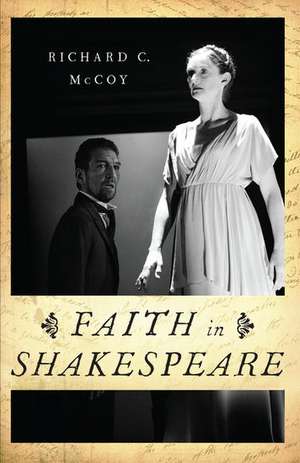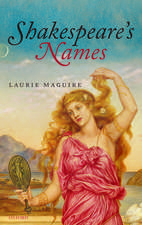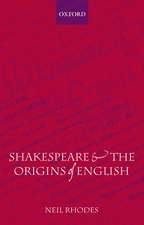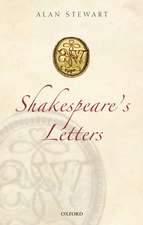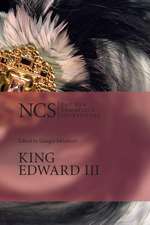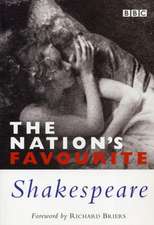Faith in Shakespeare
Autor Richard C. McCoyen Limba Engleză Paperback – 29 ian 2015
Preț: 190.06 lei
Preț vechi: 248.67 lei
-24% Nou
Puncte Express: 285
Preț estimativ în valută:
36.37€ • 39.49$ • 30.55£
36.37€ • 39.49$ • 30.55£
Carte tipărită la comandă
Livrare economică 11-17 aprilie
Preluare comenzi: 021 569.72.76
Specificații
ISBN-13: 9780190218652
ISBN-10: 0190218657
Pagini: 214
Dimensiuni: 216 x 140 x 15 mm
Greutate: 0.27 kg
Editura: Oxford University Press
Colecția OUP USA
Locul publicării:New York, United States
ISBN-10: 0190218657
Pagini: 214
Dimensiuni: 216 x 140 x 15 mm
Greutate: 0.27 kg
Editura: Oxford University Press
Colecția OUP USA
Locul publicării:New York, United States
Recenzii
Richard McCoy has written an eloquent brief for theatrical faith as the central experience in Shakespeare's theatrical art. This faith is neither divine nor fraudulent; it eschews both metaphysics and cynicism. Instead it embraces what Coleridge famously called a 'willing suspension of disbelief,' a suspension McCoy celebrates as precious human achievement.
In this humane and accessible book, Richard McCoy leaves behind unanswerable debates about Shakespeare's own theology to concentrate instead on the plays' strong insistence on the restorative powers of theatrical illusion. With masterful readings of several plays, McCoy eloquently reminds us why we care about Shakespeare.
Richard C. McCoy's new book on faith in Shakespeare proposes neither the darkness of social criticism nor sectarian religious claims. For McCoy, the mutually dependent labors of Shakespeare's extraordinary writing and the active poetic faith of auditors and readers yields an enduring harvest of healing wonder at not only the huge costs but also the immense worth of 'human love amidst all its painful flaws.'
Richard McCoy wrestles with one of the great mysteries of Shakespeare's art: how do the plays manage to compel belief, even in a skeptical age like our own? The result is a profound and illuminating study, one that will prove invaluable to playgoers, actors, and readers eager to understand how the plays work their magic.
Recommended.
Faith in Shakespeare can be defined as the true categorization of faith in Shakespeare's plays, which begins with acknowledging them as illusions and mockeries at first; then follows the understanding of these illusions as based on the human mind, which makes them not sacraments but humane reflections of human perception. McCoy discusses faith in Shakespeare in a compelling style and brilliantly awakens our faith.
In this humane and accessible book, Richard McCoy leaves behind unanswerable debates about Shakespeare's own theology to concentrate instead on the plays' strong insistence on the restorative powers of theatrical illusion. With masterful readings of several plays, McCoy eloquently reminds us why we care about Shakespeare.
Richard C. McCoy's new book on faith in Shakespeare proposes neither the darkness of social criticism nor sectarian religious claims. For McCoy, the mutually dependent labors of Shakespeare's extraordinary writing and the active poetic faith of auditors and readers yields an enduring harvest of healing wonder at not only the huge costs but also the immense worth of 'human love amidst all its painful flaws.'
Richard McCoy wrestles with one of the great mysteries of Shakespeare's art: how do the plays manage to compel belief, even in a skeptical age like our own? The result is a profound and illuminating study, one that will prove invaluable to playgoers, actors, and readers eager to understand how the plays work their magic.
Recommended.
Faith in Shakespeare can be defined as the true categorization of faith in Shakespeare's plays, which begins with acknowledging them as illusions and mockeries at first; then follows the understanding of these illusions as based on the human mind, which makes them not sacraments but humane reflections of human perception. McCoy discusses faith in Shakespeare in a compelling style and brilliantly awakens our faith.
Notă biografică
Richard C. McCoy is Distinguished Professor of English at Queens College and the Graduate Center at the City University of New York.
